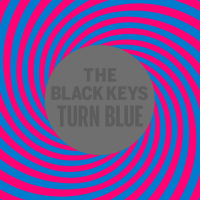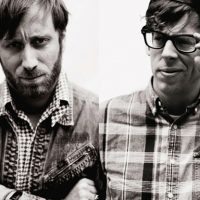
Eleni P. Austin
There is an old saying, “All true art is born from suffering.” That certainly applies to the new Black Keys album, Turn Blue.
The Black Keys formed in 2001. Guitarist/vocalist Dan Auerbach and drummer Patrick Carney grew up in the same Akron, Ohio neighborhood. They were casual friends during childhood but by the time they both attended Firestone High School they ran in different circles. A mutual friend suggested they play music together, and they experimented with a four-track recorder in Carney’s basement.
Dan Auerbach was exposed to the Blues at an early age. By college, he was fascinated by the music of Junior Kimbrough, Howlin’ Wolf and Robert Johnson. Focusing on them instead of his studies, he nearly flunked out of school. He decided to drop out and concentrate on a music career.
He began gigging around Akron as a solo artist. He enlisted Carney’s help in making a demo. The musicians Auerbach recruited for the sessions were no-shows. So Patrick sat in on drums. Thus the Black Keys were born.
The duo recorded a proper demo, made up of original songs, Blues covers and a piquant take on the Beatles’ “She Said, She Said.” Their debut, The Big Come Up, was released through the tiny L.A. based label, Alive, to immediate critical acclaim.
The Black Keys signed a two-album deal with the Fat Possum label. The label originally concentrated Mississippi Blues musicians like R.L. Burnside, T-Model Ford, Robert Belfour and Auerbach’s Blues God, Junior Kimbrough, but began branching out in the early 2000s.
Their first Fat Possum effort, Thickfreakness was recorded in Patrick Carney’s basement in a 14 hour session. It was released in early 2003 to positive reviews. The duo began opening for artists like Sleater Kinney, Beck and Dashboard Confessional.
Almost immediately Black Keys were inundated with requests to license their music for commercials. Initially, they resisted, not wanting to “sell out.” Ultimately, they relented, realizing it was a way to augment their precarious finances and provided them with tremendous exposure.
They quickly followed up in 2004 with Rubber Factory, which was recorded in a former tire factory in Akron. It was their first album to hit the Billboard Top 200, reaching #143. The band completed their contract with Fat Possum by releasing a 6 song EP, Chulahoma: The Songs Of Junior Kimbrough. They promptly signed with major label, Nonesuch. (Home to k.d. lang, Randy Newman, Emmylou Harris, Ry Cooder, Shawn Colvin and Wilco).
Their first Nonesuch effort, Magic Potion, arrived in 2006, but it was their 2008 album, Attack & Release, that put them on course for super-stardom. The album was originally conceived as a collaboration between the Keys and controversial Rock pioneer, Ike Turner. But the project was aborted, and Turner passed away.
Rather than rely on their own production skills, the duo enlisted Danger Mouse, (ne’ Brian Burton). A sonic architect who first came to prominence in 2004 when he (illegally) mashed up Jay Z’s Black Album and the Beatles White Album as the Grey Album. Danger Mouse went on to produce Gorillaz, and partnered with Cee-Lo Green as the wildly successful, Gnarls Barkley. Attack & Release entered the Billboard charts at # 14.
Black Keys relocated to Nashville, and took a break. Auerbach released a solo album, Keep It Hid, and Carney started a side project, DRUMMER. They reconvened with Danger Mouse in 2010, and recorded their next two albums, Brothers in 2010 and El Camino in late 2011. Brothers proved to be their commercial breakthrough, selling 73,000 copies in its first week, and peaking on the charts at #2. El Camino followed suit, debuting at #2. Each album won three Grammy Awards. The duo had definitely arrived.
Now they are releasing their eighth full-length, Turn Blue. Danger Mouse is again behind the boards, but in spite of their phenomenal professional achievements, the album is suffused with personal sadness, relating to the dissolution of Auerbach’s marriage.
The album opens with the expansive melancholy of “Weight Of Love.” It’s nearly two minutes of spacy, Prog-Rock instrumentation before Auerbach begins to sing. He shares his suspicions… “I used to think Darlin’ you never did nothin’/But you were always up to something.” Lengthy dueling guitar solos weave in and out of this aural tapestry underscored by rubbery bass lines. It’s a trippy collage best explored with headphones.
The next three tracks are a study in contrasts. “In Time” weds hand-clappy “Iko Iko” percussion to swoony piano chords and angular guitar riffs. Auerbach employs a quavery falsetto as he confronts the fact that his marriage is over. “You’ve got a worried mind, I’ve got a worried heart/You don’t know what to do, I don’t know where to start.”
On the title track, the languid ‘70s Soul groove belies the gloomy mood. Auerbach’s falsetto remains in full effect over serpentine guitars as he yearns for happier times… “When the music is down and all the lights are low,I will remember the times when love would really glow.”
Finally, with “Fever,” false bravado is on full display in the form of a four-on-the-floor Disco thump and playful ‘80s synth squiggles. Here, Auerbach equates love with illness and wonders if his fever will ever break.
The lyrical themes on Turn Blue deal almost exclusively with Auerbach’s heartbreak. Luckily, inventive melodies and fluid instrumentation keep things lively. This is especially true on “Year In Review,” “It’s Up To You Now” and “In Our Prime.”
Rippling percussion, thundering bass lines, fuzzy guitar riffs and swooping strings propel “Year In Review.” The stomping, Soul-tastic anthem almost camouflages Auerbach’s ever present angst as he ponders the age old question… “why you always wanna love the ones who hurt you?”
Carney pounds out a tribal “George Of The Jungle” tattoo on “It’s Up To You Now.” Scuzzy riff-age underscores Auerbach’s bitter mien… “Let you go so you could go now…” Suddenly the tempo downshifts with a thudding crunch and Auerbach rips a scabrous guitar solo that scorches the earth.
Opening with wistful piano notes that dovetail with sinewy guitar licks and a kick-drum beat, “In Our Prime” comes closest to reveal actual personal details… “the house burned down, but nothing there was mine.” Suddenly the tempo accelerates and keyboard fills echo the Beatles’ “I Am The Walrus.” A Hammond B3 solo and Auerbach’s stinging guitar connect in a desolate pas de deux.
Other stand out tracks include the muscular “10 Lovers,” and the propulsive see-saw of “Bullet In The Brain.” The duo channel the shimmery Philly Soul of the Stylistics on “Waiting On Words.”
The album closes with “Gotta Get Away.” The song shares musical DNA with the Rolling Stones’ “Dead Flowers.” Here a road trip provides real escape all the tsuris. It’s a spirited finish to an anxious album.
Fans who know the Black Keys exclusively through Brothers and El Camino may find the experimentation on this album somewhat disconcerting. But part of this band’s longevity can be traced to their willingness to create new textures. Even though Turn Blue is steeped in personal sorrow, artistically, it’s a triumph.













































